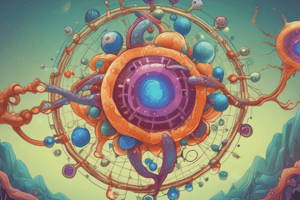Podcast
Questions and Answers
What is the primary focus of Cell Biology?
What is the primary focus of Cell Biology?
- The structure and function of cells (correct)
- The exploration of evolutionary processes
- The study of microorganisms
- The chemical reactions in living organisms
Which principle explains why organisms with advantageous traits are more likely to survive?
Which principle explains why organisms with advantageous traits are more likely to survive?
- Homeostasis
- Evolution by Natural Selection (correct)
- Metabolism
- Cell Theory
Which of the following is NOT a branch of Biology?
Which of the following is NOT a branch of Biology?
- Genetics
- Zoology
- Botany
- Psychology (correct)
What does photosynthesis primarily convert into energy?
What does photosynthesis primarily convert into energy?
What is metabolism in biological terms?
What is metabolism in biological terms?
Flashcards
Cell Biology
Cell Biology
The study of the structure and function of cells, the basic units of life.
Evolution by Natural Selection
Evolution by Natural Selection
Organisms with beneficial traits are more likely to survive and reproduce, thus passing these traits to offspring.
Homeostasis
Homeostasis
Maintaining a stable internal environment in an organism, controlling temperature and chemicals.
Photosynthesis
Photosynthesis
Signup and view all the flashcards
Cellular Respiration
Cellular Respiration
Signup and view all the flashcards
Study Notes
Introduction to Biology
- Biology is the scientific study of life and living organisms.
- It encompasses a vast range of topics, from the smallest molecules within cells to the largest ecosystems on Earth.
- Biology studies the structure, function, growth, origin, evolution, and distribution of living organisms.
Branches of Biology
- Cell Biology: Focuses on the structure and function of cells, the basic units of life.
- Genetics: Studies heredity and the variation of traits among organisms. Examines genes, DNA, and how traits are passed down.
- Molecular Biology: Explores the processes occurring at the molecular level within organisms. This includes the structure and function of molecules like DNA and proteins.
- Evolutionary Biology: Investigates the processes of change in organisms over time, including natural selection and adaptation.
- Ecology: Examines the interactions between organisms and their environment. It studies populations, communities, ecosystems, and the biosphere.
- Botany: The scientific study of plants.
- Zoology: The scientific study of animals.
- Microbiology: Studies microorganisms, including bacteria, viruses, fungi, and protists.
- Physiology: Focuses on the normal functions of living organisms and their parts.
Key Concepts in Biology
- The Cell Theory: All living things are composed of cells, and all cells arise from pre-existing cells.
- Evolution by Natural Selection: Organisms with traits best suited to their environment are more likely to survive and reproduce, passing those advantageous traits to their offspring.
- Homeostasis: The maintenance of a stable internal environment in an organism. This includes temperature regulation, chemical balance, and water balance.
- Energy Flow in Ecosystems: Energy from the sun flows through an ecosystem through various trophic levels.
- Genetics and Heredity: The mechanisms by which traits are passed from one generation to the next. This involves DNA, genes, and chromosomes.
Biological Processes
- Metabolism: All chemical reactions in an organism that enable it to live. This includes both energy-releasing (catabolism) and energy-requiring (anabolism) reactions.
- Photosynthesis: The process by which green plants and some other organisms use sunlight to synthesize foods from carbon dioxide and water.
- Cellular Respiration: The process by which cells break down glucose to release energy in the form of ATP.
- Reproduction: The process by which organisms produce offspring.
Scientific Method
- The scientific method is a systematic way of investigating the natural world, using observations, questions, hypotheses, experiments, and conclusions.
- Key aspects include: observation, question formation, hypothesis development, experimentation, data analysis, and conclusion drawing.
Levels of Biological Organization
- Atoms: The fundamental building blocks of matter.
- Molecules: Groups of atoms bonded together.
- Cells: The basic units of life.
- Tissues: Groups of similar cells working together.
- Organs: Groups of tissues working together.
- Organ Systems: Groups of organs working together.
- Organisms: Individual living entities.
- Populations: Groups of organisms of the same species in a given area.
- Communities: Interacting populations in an area.
- Ecosystems: Communities plus their physical environment.
- Biosphere: The global ecosystem encompassing all living things and their environments.
Studying That Suits You
Use AI to generate personalized quizzes and flashcards to suit your learning preferences.




